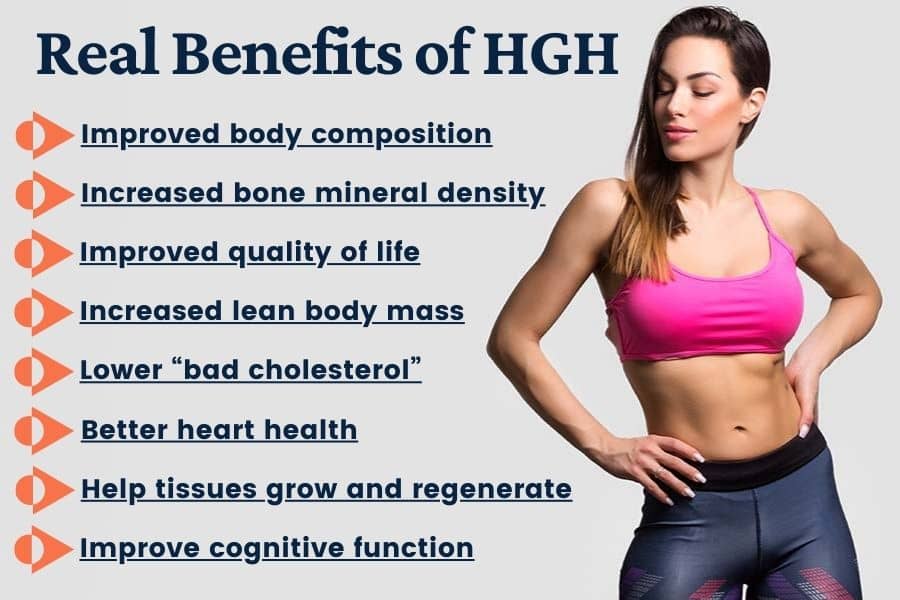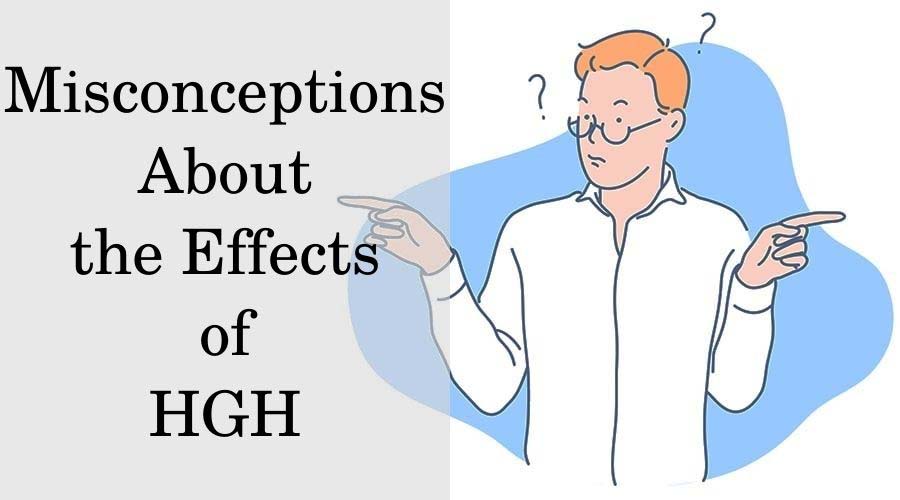Maintaining optimal GH levels throughout adulthood is equally important since the hormone plays a key role in regulating your metabolism.
What is more, it helps your body burn fat, preserve muscle, build bones and heal injuries.
That’s why developing a growth hormone deficiency (GHD) can have a detrimental effect on your body composition, body fat, energy levels, and quality of life.
The condition is irreversible and occurs when your pituitary gland can no longer produce enough HGH. That’s why if you have GHD, the only way to restore the hormonal balance in your body is via exogenous growth hormone, in the form of HGH therapy.
Scientifically proven benefits that you may expect include improved fat loss, increased muscle mass and strength, better sleep and mood, and higher bone mineral density.
Health benefits of HGH therapy for adults
HGH therapy involves taking injections with recombinant growth hormone (rHGH) which was first produced via recombinant DNA technology in 1981.
The technology allows scientists to produce a hormone that is indistinguishable from the one synthesized in healthy individuals.
Since then, rHGH has been an object of extensive clinical research regarding its safety and effectiveness, which led to the FDA approval of the first HGH brand in 1985. Initially, it was only available for treating GHD and short stature in children.
Currently, HGH therapy using recombinant growth hormone has been studied for more than 40 years and continues to be studied today. Now several brands are FDA-approved for use in both children and adults and each has undergone extensive clinical trials.
In total, there are more than 700 clinical trials in adults with GHD and several thousand studies with children
For example, the latest guideline on the treatment of adult growth hormone deficiency by the Endocrine Society is based on more than 200 publications and clinical investigations.
The research demonstrates that the best HGH injections can provide numerous benefits for GHD patients including:
- improved body composition
- increased exercise capacity
- improved skeletal integrity
- healthier cholesterol levels
- improved cardiovascular health
- better quality of life
In addition, the FDA has approved HGH therapy in adults with muscle wasting due to HIV/AIDS and short-bowel syndrome, and the list of indications may keep increasing.
The only form of growth hormone therapy which has undergone extensive scientific investigation is HGH injections. That’s because they are the most effective method for administering the hormone in your body.
Due to the peptide structure of growth hormone, it can’t get absorbed through the skin. Oral therapy is also not an option since the human gastrointestinal system breaks peptide hormones down and inactivates them completely.
Over-the-counter products such as supplements, boosters, or homeopathic remedies do not contain HGH
What is more, dietary supplements and HGH boosters are not effective in increasing GH levels in patients with GHD due to the irreversible nature of the condition.
In fact, there is also insufficient evidence to support the effectiveness of these products in healthy people.
HGH Decreases Body Fat
The growth hormone has a potent catabolic effect on your body fat, especially the fat that builds up around your waistline and abdominal organs.
That’s why GHD patients are more likely to pack extra pounds around their waist, which can lead to visceral obesity and an increased risk of metabolic problems.
In such cases, HGH therapy can improve body composition by helping you lose abdominal fat. What is more, this is the first benefit to expect once you start your treatment.
It will help you burn fat from all body sites but predominantly it will reduce your waist circumference which in turn improves your cholesterol levels and heart health.
HGH Increases Lean Body Mass
If you have GHD, then you are much more likely to lose muscle mass. That’s because GH plays a key role in protecting your muscles from wasting.
Taking HGH injections can increase lean body mass and prevent muscle breakdown by stimulating muscle protein synthesis.
Furthermore, growth hormone treatment can also boost your muscle strength and energy levels back to their levels before developing the condition.
HGH Increases Bone Mineral Density
GHD can make you 2-5 times more likely to develop osteoporosis and suffer from a bone fracture. That’s because without growth hormone you lose bone mineral density much faster.
Since the growth hormone is anabolic for your bone tissue, HGH therapy can increase bone mineral density by up to 10%.
Yet, keep in mind that this benefit usually occurs much slower than the rest of the effects of GH therapy. It may take 6-12 months of daily HGH injections until your fracture risk is reduced.
HGH Improves Quality of Life
HGH therapy can increase your energy levels, improve the quality of your sleep and boost your libido. These benefits ultimately improve your quality of life.
In addition, patients with GHD often suffer from hypersensitivity to pain which can also be ameliorated by HGH therapy.
The majority of the effects occur within the first 3 months when HGH therapy improves the quality of life.
HGH Lowers “bad cholesterol” and Improves Heart Health
If your GHD remains untreated, you are at an increased risk for cardiovascular disease.
HGH treatment can reduce total cholesterol, LDL (bad cholesterol) levels and inflammation. At the same time, the treatment improves the levels of HDL (good) cholesterol which slows down atherosclerosis.
As a result, GH replacement will reduce the thickness of your artery walls that supply your heart with blood and lower your risk for myocardial infarction.
Furthermore, HGH improves vasodilation in response to stress and exercise, which results in reduced blood pressure.
HGH Helps in Recovery
Growth hormone is an anabolic hormone that stimulates the cellular proliferation and growth of the majority of your tissues and organs. This is the process of cell division and multiplication.
Since this process also plays a role in tissue repair, HGH treatment may speed up the recovery after injuries. Tissues and organs which regenerate via cell proliferation include your skin, tendons, liver, etc.
The treatment can also help preserve muscle mass during periods of recovery. The process usually requires much larger doses compared to standard therapy for GHD.
HGH Improves Cognitive Function
Receptors for the HGH can also be discovered in a part of the brain called the hippocampus. This area controls memory, learning, and emotions.
This is likely the reason why patients with adult-onset GHD commonly report difficulty concentrating, reduced attention span, brain fog, and even atypical depression. The latter can additionally hamper your mental performance.
If you have GHD, HGH therapy can improve memory and boost concentration. It will also alleviate your symptoms if you have atypical depression.
Scientists suspect that GH treatment can even alter the brain’s morphology and connectivity to reduce mental fatigue and improve cognition.
Misconceptions about the effects of HGH treatment
Due to the wide range of benefits in GHD patients, HGH therapy is also a subject of interest by healthy people, including those who seek better physical performance, more aesthetic physiques, or youthful appearance.
This has led to many myths and misconceptions about growth hormone therapy and its effects.
For example, some athletes and bodybuilders abuse large doses of HGH injections in an attempt to increase their energy levels and burn more fat.
Yet, studies have shown only small benefits in terms of fat loss in healthy people. There is insufficient evidence to suggest that injections can lead to a significant weight loss or performance enhancement in those without medical indications.
On the other hand, achieving even small benefits requires large doses of HGH in healthy people, which increases the risk for severe adverse reactions such as insulin resistance and water retention.
HGH therapy is also often used off-label as an anti-aging therapy, even though studies do not support such benefits. Although the hormone stimulates the proliferation of new cells, this does not necessarily mean that it can reverse aging in these tissues.
In fact, some authors suggest that faster cell proliferation may speed up aging rather than slow it down, especially in older individuals.
If you are an adult, HGH cannot help you grow taller either. In excessive doses, it can only make your bones grow thicker and lead to deformations, called acromegaly.
That’s because the growth plates in your bones have closed and they can no longer produce new bone tissue that increases bone length. The closure of the growth plates usually occurs towards the end of puberty.
Although HGH is anabolic, it doesn’t have the same effects or risks as anabolic steroids. Therefore it can’t cause infertility or affect breast size in men or women. There haven’t been reported any effects on the menstrual period in females.
The promising effects of GH warrant further research
There is insufficient evidence to suggest if HGH can help men with erectile dysfunction or infertility. That is despite the fact that preliminary research suggests HGH therapy has benefits for natural testosterone production, vasodilation, and sexual desire. However, growth hormone alone is unlikely sufficient to treat erectile dysfunction or improve male fertility.
HGH therapy is also successfully used to stimulate growth in children with kidney problems or kidney failure. However, the treatment cannot improve or restore kidney function in those patients. On the other hand, the therapy does not pose a risk for kidney function in people with healthy kidneys.
Currently, growth hormone treatment is under investigation for a possible benefit in patients with hearing loss caused by auditory nerve damage. Unfortunately, there is not enough evidence to recommend the treatment for this or any other neurological condition.
Get a free consultation with our medical expert for any questions about hormone replacement therapy



